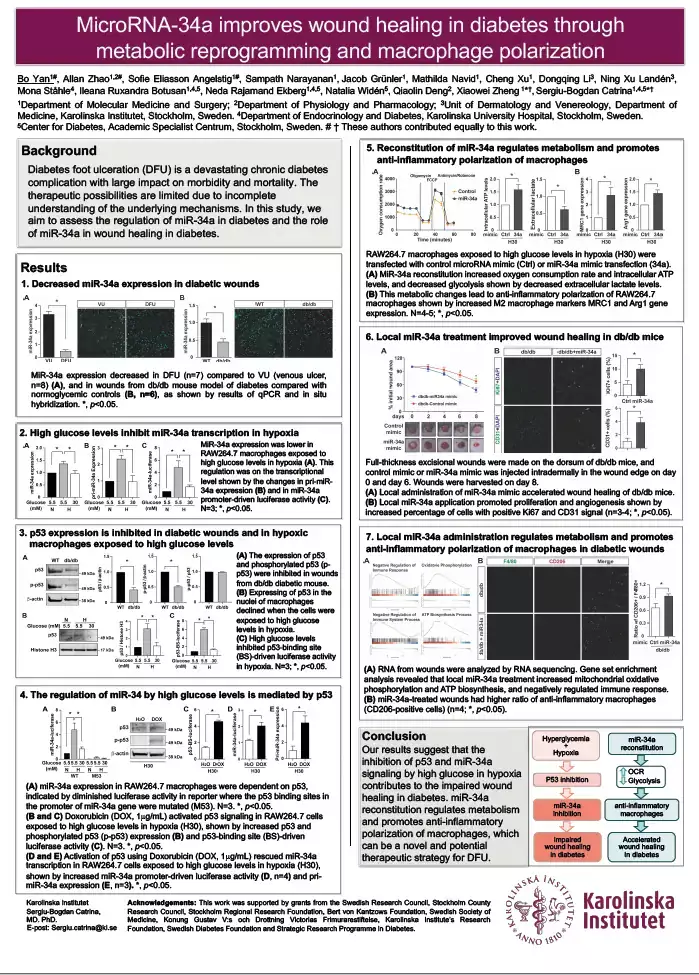Poster 22 - Bo Yan, Growth and Metabolism
MMK Department's Day 2024

Bo Yan, Growth and Metabolism
Title: MicroRNA-34a improves wound healing in diabetes through metabolic reprogramming and macrophage polarization
Summary
Background and aims
Diabetes foot ulceration (DFU) is a devastating chronic diabetes complication with large impact on morbidity and mortality. The therapeutic possibilities are limited due to incomplete understanding of the underlying mechanisms. In this study, we aim to assess the role of microRNA (miR-34a) in wound healing in diabetes.
Materials and methods
MiR-34a levels were analyzed in biopsies from DFUs and in the wounds from db/db mouse model of impaired wound healing in diabetes compared to normoglycemic controls. The regulation and function of miR-34a in diabetes were further analyzed in macrophages (RAW264.7 cells) and db/db mice.
Results
We found that the hypoxia-induced expression of miR-34a was inhibited by hyperglycemia in macrophages (1.4±0.2 vs 1.0±0.3, n=6, P<0.05). This regulation was on the transcriptional level shown by the changes in miR-34a promoter-driven luciferase (miR-34-luciferase) activity (1.0 at normoxia, 4.3±1.0 at hypoxia and 1.7±0.2 at hypoxia and exposed to high glucose; n=6, P<0.05) and pri-miR-34a levels (1.0 at normoxia, 5.6±0.3 at hypoxia and 1.2±0.1 at hypoxia and exposed to high glucose; n=5, P<0.01).
This regulation was mediated by the upstream regulator p53. P53 expression was inhibited in wounds from mouse model of diabetes and in macrophages that were exposed to high glucose at hypoxia. High glucose at hypoxia inhibited p53-binding site-driven luciferase activity (from 6.1±0.3 to 1.4±0.1, n=3, P<0.05). Activation of p53 using Doxorubicin rescued pri-miR-34a expression (from 1.0±0.5 to 4.4±0.8, n=3, P<0.05) and miR-34a luciferase activity (from 1.2±0.1 to 2.0±0.2, n=4, P<0.05). These results suggest that the inhibition of miR-34a in diabetes is mediated by p53.
Local administration of miR-34a mimic improved wound healing in db/db mice (P<0.05). RNAsequencing data suggested that miR-34a affects the oxidative metabolism and inflammatory response in the wounds. These resulted in a pro- to anti- inflammatory polarization changes of macrophages.
Conclusion
Our results suggest that the inhibition of p53 and microRNA-34a signaling contributes to the impaired wound healing in diabetes through the regulation of macrophage polarization. miR-34a reconstitution can be a novel potential therapeutic strategy for DFU.
